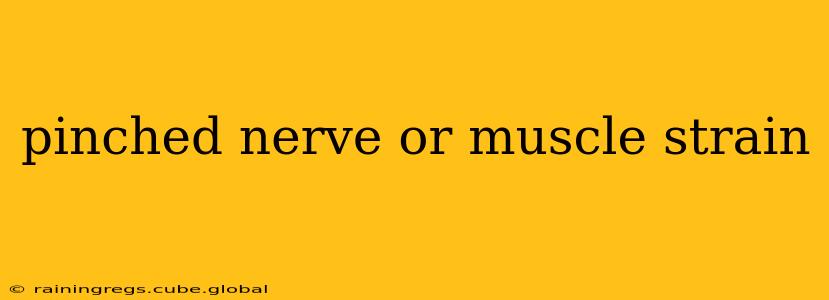Experiencing pain in your neck, back, or limbs can be incredibly debilitating. Two common culprits are pinched nerves and muscle strains. While both cause discomfort and limit mobility, understanding the key differences is crucial for proper diagnosis and treatment. This article will explore the distinctions between a pinched nerve and a muscle strain, helping you better understand your symptoms and seek appropriate medical attention.
What is a Pinched Nerve?
A pinched nerve, also known as a compressed nerve, occurs when surrounding tissues, such as bones, cartilage, tendons, or muscles, put pressure on a nerve. This pressure disrupts the nerve's ability to send signals, resulting in pain, numbness, tingling, or weakness in the affected area. The location of the pinched nerve dictates the symptoms; for example, a pinched nerve in the neck (cervical radiculopathy) might cause pain radiating down the arm, while a pinched nerve in the lower back (lumbar radiculopathy) might cause pain radiating down the leg (sciatica).
What is a Muscle Strain?
A muscle strain, often called a pulled muscle, is an injury to a muscle or its tendon. It occurs when the muscle is overstretched or torn, resulting in pain, swelling, and muscle spasms. The severity of a muscle strain can range from mild to severe, depending on the extent of the damage. Common locations for muscle strains include the back, hamstring, calf, and shoulder.
What are the Symptoms of a Pinched Nerve?
Pain: Sharp, shooting, or burning pain is a hallmark symptom of a pinched nerve. This pain often radiates along the path of the affected nerve.
Numbness: A loss of sensation or tingling in the area supplied by the compressed nerve.
Weakness: Muscle weakness or difficulty controlling muscles in the affected area.
Tingling: A pins-and-needles sensation, often accompanied by pain or numbness.
What are the Symptoms of a Muscle Strain?
Pain: Muscle strains typically cause a dull, aching pain that is localized to the injured muscle.
Swelling: Swelling and inflammation are common after a muscle strain.
Muscle Spasms: Involuntary muscle contractions can occur, causing stiffness and further pain.
Limited Range of Motion: Difficulty moving the affected muscle or joint.
How Can I Tell if I Have a Pinched Nerve or Muscle Strain?
Differentiating between a pinched nerve and a muscle strain can be challenging, as both share some similar symptoms, primarily pain. However, certain characteristics can help distinguish them:
- The type of pain: Sharp, shooting, or electric pain often points towards a pinched nerve, while dull, aching pain is more typical of a muscle strain.
- The location of pain: Pinched nerve pain typically radiates along the nerve's pathway, whereas muscle strain pain tends to be localized to the affected muscle.
- Associated symptoms: Numbness, tingling, and weakness are more commonly associated with pinched nerves.
How are Pinched Nerves and Muscle Strains Diagnosed?
A healthcare professional, usually a physician or physical therapist, will conduct a physical examination and review your medical history to diagnose the condition. Imaging tests, such as X-rays, MRIs, or CT scans, might be necessary to confirm the diagnosis and rule out other potential causes.
How are Pinched Nerves and Muscle Strains Treated?
Treatment for both pinched nerves and muscle strains often involves:
- Rest: Avoiding activities that aggravate the pain.
- Ice: Applying ice packs to reduce swelling and inflammation.
- Over-the-counter pain relievers: Medications like ibuprofen or acetaminophen can help manage pain.
- Physical therapy: Exercises and stretches to improve range of motion and strengthen muscles.
- Injections: In some cases, corticosteroid injections may be used to reduce inflammation around a pinched nerve.
- Surgery: Surgery might be considered for severe cases of pinched nerves that don't respond to other treatments.
Can a pinched nerve cause muscle strain?
While not a direct cause-and-effect relationship, a pinched nerve can indirectly contribute to muscle strain. The pain and altered nerve signals from a pinched nerve can lead to muscle guarding – where the body involuntarily tenses muscles to protect the injured area. This prolonged tension can eventually result in a muscle strain.
Can a muscle strain cause a pinched nerve?
Similarly, severe muscle spasms from a significant muscle strain can sometimes compress nearby nerves, leading to symptoms similar to a pinched nerve.
When should I see a doctor?
Seek medical attention if your pain is severe, doesn't improve with home care, or is accompanied by numbness, weakness, or bowel/bladder dysfunction. Prompt diagnosis and treatment are crucial for optimal recovery.
This information is for general knowledge and informational purposes only, and does not constitute medical advice. It is essential to consult with a qualified healthcare professional for any health concerns or before making any decisions related to your health or treatment.
